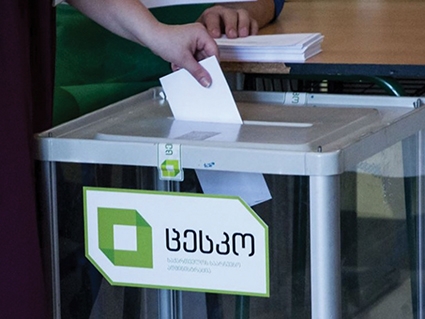NDI Releases Findings & Recommendations Ahead of Local Elections in Georgia
An international delegation organized by the National Democratic Institute (NDI) has released a statement regarding their findings ahead of the October local elections in Georgia.
The NDI delegation held meetings in Georgia on July 17-21 to assess electoral preparations in advance of the October local elections, review the broader political environment; examine factors that could affect the integrity of the electoral process, and to offer any recommendations that could advance dialogue and consensus-building toward peaceful, credible elections and public confidence in the process.
“Georgia approaches the October local government elections equipped with a deep reserve of democratic assets. Georgians have many achievements to their credit, including a vibrant political landscape, and [they] overwhelmingly support a democratic future for their country,” the statement reads.
The NDI says that the delegation encountered two parallel and divergent Georgias: one seen through the lens of the ruling Georgian Dream (GD) party leaders and officials, and one described by all other groups with whom the delegation met - domestic and international NGOs and observers, all other parliamentary and non-parliamentary parties and candidates, the President’s Office, and media organizations.
“In the view of the former group, there are very few democratic challenges. There are limited threats to media freedom and access, adjudication of electoral and political cases is swift and unbiased, there are few obstacles to equitable political competition; and reforms - whether constitutional or legal - have taken into account input and are pursued with the aim of improving democratic practices,” the organization says.
However, the statement stresses there are also a number of significant democratic challenges: uneven and political application of the law and resolution of disputes, an unlevel playing field for parties and candidates, pressure on potential funding sources, legal and constitutional reforms designed to politically benefit the ruling party, shrinking media space for alternative viewpoints, and abuses of state resources, including interference by the state security services.
The organization also says that before the October 2017 local elections, Georgia’s constitution, election code, and local government legislation are in the midst of significant reform processes.
“NGOs and opposition parties have criticized all three reform processes as lacking sufficient transparency and inclusiveness. Concerns have also been raised about the timing of these reforms so close to election day. Together, these issues could impact trust in the electoral process,” the document reads.
The organization added that these constitutional and legal reforms did not include measures to increase gender equity, saying only 15 percent of parliamentary seats are held by women and 12 percent of local councilors are women.
Furthermore, The NDI included unequal funding of parties and abuse of state resources in the list of key findings.
The statement says that Georgia’s media environment remains one of the most free and diverse in the former Soviet Union and repression against individual journalists is rare.
Nonetheless, the organization noted that politicization of the media shapes coverage and allegations of undue government influence over station management and editorial choices have been a source of concern, both of which could hamper citizens’ ability to make informed political choices.
Moreover, the statement reads that concerns were repeatedly raised by political parties and NGOs regarding what they believe to be a lack of adherence to rule of law, particularly regarding acts of violence and legal charges from both the 2016 electoral period as well as in recent months.
“They pointed to a pattern of delayed investigations, selective pursuit of cases, pressure on judges, and uneven and disproportionate application of sanctions,” the statement reads.
The NDI delegation provided a number of recommendations for the political parties, parliament, media, NGOs and international community. These included more inclusive, consensus-based constitutional and legal reform processes; a political party code of conduct emphasizing a commitment to nonviolence; changes in parties’ internal behaviors and practices to attract and prioritize women candidates, as well as ensuring a minimum of 30 percent women candidates on City Council party lists; improved training for poll workers on counting and reconciliation procedures; concrete strategies to mitigate disinformation; impartial and timely application of justice; and increased support for local media outlets and citizen election observer groups.
The organization added that the mission is the first activity in NDI’s international election observation of the local elections.
In August, NDI will deploy a team of long-term observers. This will be supplemented by an international Election Day observation delegation.
Thea Morrison












